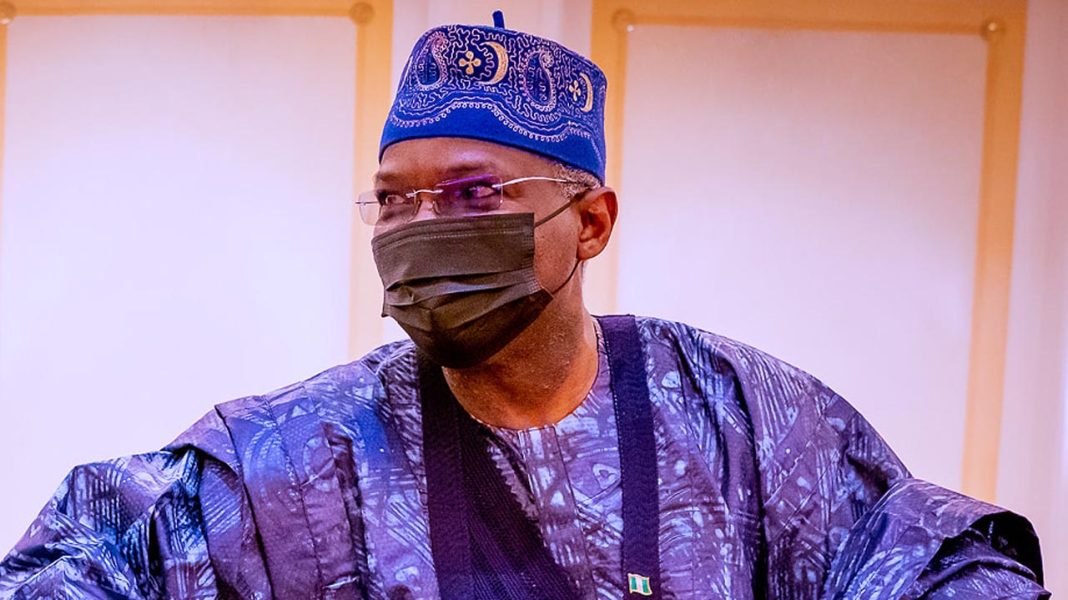By Perpetua Onuegbu/Angela Atabo
Mr Babatunde Fashola, Minister of Works and Housing, said on Thursday in Abuja that President Muhammadu Buhari delivered on his housing promise and created more than 29,300 jobs in the process.
Fashola made the declaration at a programme to mark the 2022 World Habitat Day with the theme: “Mind the gap. Leave no-one and place behind’’.
He said the ministry’s National Housing Programme had provided houses that could be seen, but that there were also human empowerment stories behind the buildings.
“We tried not to leave anyone behind.
“On the journey to provide houses, 43 construction sites were established in 35 states to deliver more than 6,000 units. There were 29,300 jobs involved in the process; 29,300 human beings working from different families.
“There are 57,874 indirect employees, 1,245 building contracting companies who won the contracts to build. These are the small businesses that make up the bulk of every economy in this world,’’ he said.
Fashola added that he went round the 36 states, saw and heard stories of citizens whose lives were transformed through the housing projects either directly or indirectly.
He added that the Federal Housing Authority also created employment for 46,420 Nigerians during the construction of 2,382 housing units out of which 1,462 units had been completed.
“I am sure you all recall that in 1994 when the Super Eagles won all sorts of trophies, our government promised the players houses, but for 28 years the footballers were waiting on that promise.
“Some of the houses we delivered, President Buhari approved that every member of that team should be given a house to redeem that pledge, so they are no longer left behind,’’ he said.
Fashola noted that urbanisation was occurring rapidly in Nigeria and that the 56 per cent rising rate was almost six times higher than the 10 per cent recorded in 1950.
He said that this meant that more than 115 million of the total population now lived in cities and the rest 91 million lived in rural areas.
He added that with cities growing at an average rate of more than 4 per cent, adding 45 million new residents between 2015 and 2025 and another 40 million by 2035, Nigeria’s future is increasingly urban.
The minister reiterated the government’s efforts at providing access to basic services like potable water, sanitation, and ensuring access to a safe and efficient public transport system.
“Agencies of the ministry such as the Federal Mortgage Bank of Nigeria (FMBN) and the Federal Housing Authority (FHA) are also contributing to the provision of housing in diverse ways.
“This is aimed at closing the gaps and leaving no one and place behind.
“FMBN has a policy of reducing equity contribution from 5 per cent to 0 per cent for those seeking mortgage loans of up to N5 million.
“The policy also reduced equity participation from 15 per cent to 10 per cent for those seeking loans above N5 million.
“This helps to ease access to housing just as its operational performance up to the second quarter of 2022 shows,’’ Fashola said.
In his remarks, Mr Madu Hammond, FMBN’s Managing Director, said that the bank was working to leave no one and no place behind in line with the theme for the World Habitat Day.
Hammond said there was need to tackle human and environmental challenges and increase inclusiveness and best practices to reduce Nigeria’s housing deficit.
President of the NLC, Mr Ayuba Wabba, in his remarks, called for the introduction of people-centred policies to allow for access to land, while housing cost should be made affordable.
Represented by Mr Benson Upah, NLC’s Head of Information and Public Affairs, Wabba said cities should be designed to accommodate the interest of the poor.
He called on the construction sector to take into cognisance the use of local resources instead of depending on foreign materials.
“The capacity of the FMBN should be strengthened to be able to cope with housing demands.
“Except we manage the growing gap, growing poverty, growing dispossession, and growing anger, there will be a price to pay,’’ he stressed. (NAN)

































